The old walled towns are densely packed with medieval churches, Arabic forts, watchtowers, palaces, bodegas, tobacconists, scooters, bars full of bullfighting paraphernalia, kids on pink bicycles, and people eating fish at rickety tables that block the traffic.
The spaces in between the coastal towns of Cádiz province – craggy mountains, pine forests, fields and endless beaches – are empty and wild. Over it are big skies which, given the guaranteed 300 days of sun a year, are almost always blue and bright, hence the name given to this stretch of the Atlantic coast, Costa de la Luz, or coast of light.
The province of Cádiz feels more foreign, exotic and isolated than neighbouring Málaga. Popular with visitors 3,000 years ago, it’s currently going through an “undiscovered” phase. And, in the south especially, there’s more evidence of centuries of Arab rule: there’s fierce heat (down to a pleasant 20C average in October), dust, wrenching flamenco coplas (songs) playing in shops, bars and taxis, and you can see Africa from the beaches. It’s also more laid-back, thanks in part to sherry. The coastal towns of Sanlúcar de Barrameda, El Puerto de Santa Maria, Cádiz and nearby Jérez, are important points on the official sherry triangle, and awash with it.
There’s a lovely, logical route along the coast, heading south from Sanlúcar de Barrameda (erstwhile home of Christopher Columbus and Ferdinand Magellan, and a gateway to the new world in the early 16th century) through the city of Cádiz, to the deservedly touristy Vejer de la Frontera, and the unspoiled beaches of Zahora, Zahara, Bolonia and Valdevaqueros, before ending up in Tarifa. Straight through, it would take less than three hours, but to do it justice, allow a week … or a month.
What to do
Cádiz city
The best way to appreciate Cádiz – as well as Tarifa, Sanlúcar and, to a lesser extent, Jérez – is by wandering aimlessly. This is for two reasons. First, the city’s history of being occupied by Romans and Moors, enriched by trade with the new world, sacked by the British, fortified, and matured in the damp sea air means every one of its narrow cobbled streets spans centuries of history and has eyefuls of sights. Second, it’s impossible not to get lost (although, because it’s a small city, and bordered on three sides by beautiful beaches, not for long). Look out for the cathedral with its golden dome; the 18th-century watchtower, Torre Tavira; the Mercado Central; and the Freiduría Las Flores, the best of the city’s many fried frish joints.
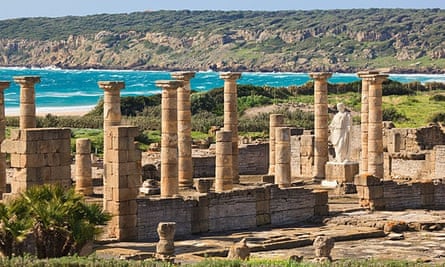
Baelo Claudia Roman ruins, Bolonia
If you ignore the three beach bars close by the fish salting vats, little appears to have changed in Baelo Claudia since its heyday during the reign of Claudius. The villas, forum, shops, basilica and baths aren’t what they were in 2AD – when an earthquake accelerated the decline in its fortunes – but it’s easy to imagine the citizens looking out to sea while waiting for the action to kick off in the amphitheatre. Various feet, heads, urns and reclining gods are displayed in the modern museum, an architectural gem. Bolonia beach is one of Spain’s best – long, unspoiled and backed by pine forest. (Turn right for the dunes, left for the nudist cove.)
Closed Mondays, free entry for EU visitors
Museo de la Manzanilla and Bodegas Barbadillo, Sanlúcar
This museum would be a good way to glean information pertinent to buying sherries of all kinds – olorosos, manzanillas and palo finos – but for the tasting session at the end which will wipe your memory clear. However, the chance to pad through the shadowy aisles of damp barrels, and admire the ecclesiastical architecture shouldn’t be missed. There are nine bodegas here, but Barbadillo, which swallowed up convents and houses, Pacman-like, in the 19th century, is the biggest. Invest €6 in a bottle of Solear as you exit through the gift shop.
Calle Sevilla 6, barbadillo.com, tours 11am (English), noon and 1pm (Spanish), €6pp
Windsurfing, kite surfing, and surfing, Tarifa
The heady combination of strong winds, warm winters and extensive sandy beaches have established Tarifa as a top destination for year-round wet fun. There are dozens of schools offering every possible permutation of tuition and course, from a three-hour try-out upwards (from beginner to winner, as they say), as well as shops selling and renting equipment. You’ll see signs to schools as you pass Punta Paloma on the N340 to Tarifa, and nothing but as you enter Tarifa itself.
Classic site
The golden-domed Cádiz cathedral is best seen close to sunset from the sea wall along Campo del Sur – followed (if you can there in time) by a sundowner at nearby Playa de la Caleta.
Hidden gem
For cowbells, paella pans, olive oil, boots, cockerels or just an insight into shopping, rural Cádiz style, visit Ignacio Castro’s farm supply shop. It’s below Vejer at the Medina road junction.
Don’t miss
The chance to hear flamenco in a local peña (live music venue), there are plenty to choose from, go where the locals head ... just don’t clap along or ask for a gin and tonic.
Where to eat
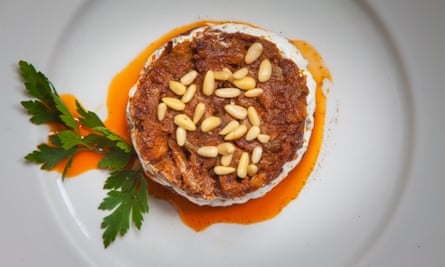
Casa Balbino, Sanlúcar
The heavenly combination of local seafood and local wine is ubiquitous in Cádiz, but nowhere is it as good as at family-run Balbino. Now 75 years old, the restaurant attracts celebrities, politicians and well-heeled locals, though it’s far from fancy. You have to squeeze in, claw your way along the seafood display, order by weight at the bar, balance your teetering stack, and eat standing up under a bull’s head and framed matador snaps. Thankfully, the staff are funny and fast, and the food – mojama (sundried tuna), squid, stuffed spider crabs, baby sole, langoustines – is delicious. Meat is available, but it’s fish and seafood tapas, hot and cold, that this place is famed for, and tortillitas de camarones (shrimp fritters) above all. So good, and so cheap.
Plaza de Cabildo 14, casabalbino.com
El Lola, Tarifa
You’re spoilt for choice tapas-wise in old Tarifa but for a relaxed cafe atmosphere matched with top-class food, family-run El Lola is hard to beat. Try the garlicky potatoes with fresh mackerel, and then the langoustines, avocado and wasabi, with the degustación de atún rojo (red tuna tasting plate) for starters. There’s a flamenco theme going on here – tables have polka-dot covers and the bearded waiter sports a frilly apron. El Lola is the last in a lane that is full of bars, so you could start at the originals – Los Melli and El Paisillo – and work your way down.
Calle Guzmán el Bueno 5
El Jardín del Califa, Vejer
Africa, just across the Strait of Gibraltar, is resolutely ignored as inspiration by most local chefs. But El Jardín del Califa is the exception, with a predominance of North African dishes, served under palm trees in a walled courtyard lit by flaming torches. It offers an all-encompassing dining experience, from the exotic setting, right through the mezes, pastelas (meat pastries) and tagines, to the Sultan’s cheesecake. It’s deservedly popular (Moorish and moreish), so book well in advance.
Plaza de España 16, +34 956 447 730, jardin.lacasadelcalifa.com, closed January
Restaurante Joselito Huerta, Sanlúcar
José opened a bar here on the sandy shores of the Guadalquivir estuary 55 years ago, serving sherry to fishermen at the end of a long morning. Inevitably, it wasn’t long before he hit on the bright idea of cooking their catch, too. The menu is basically a list of things caught in the sea, fried and served with a slice of lemon. The clientele is local and loyal. Weather permitting, tables and umbrellas are set up at the water’s edge, offering a view of boats, and the dunes and bird haven that is Doñana national park. Confused by choice? Go for the selection of fried fish, the surtido, in small, medium, or large.
Avenida Bajo de Guía 30, +34 956 362 694, joselitohuerta.com
Where to drink
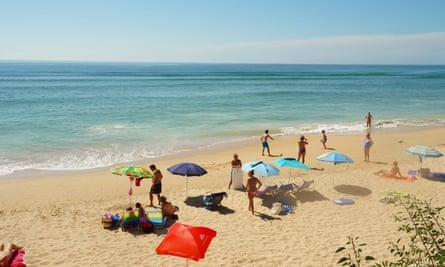
Bar Barbiana, Sanlúcar
It has the look of a pricey deli – backlit shelves of wine, artfully arranged langoustines – but the football is always on the television, the mood’s relaxed and the drinks are cheap. Like just about every bar in Cádiz, it does food, and it is excellent – try the papas aliñas (potatoes , olive oil, sherry vinegar, parsley and chives). Outdoor tables provide front-row viewing for the evening paseo in cheery Plaza del Cabildo.
Calle Isaac Peral 1
Taberna la Manzanilla, Cádiz
At first glance it looks like a farmacia … except that all the medicine in the dark old cabinets is manzanilla sherry. The walls are lined with bottles of all sizes and ages, many of the ornate faded labels signed by matadors, flamenco stars and other local celebs. They are not for drinking, so don’t ask. What you want is in the salty, tangy manzanilla in the barrels. The regulars may fall silent as you enter and the system and the choice appear baffling, b ut just ask for a vino and slide over a couple of euros. Whatever happens next will be good.
Calle Feduchy 19, lamanzanilladecadiz.com, closed Sat and Sun eves
Sajorami Beach, Zahora
Andalucía’s iconic beach bars, the chiringuitos, batten down the hatches mid-September, but this one – part of a laid-back hotel – stays open through October. Tables and benches are set in the sand on a bluff above either glassy lagoons or frothy Atlantic rollers, depending on the tide. The Battle of Trafalgar took place just off here in October 1805, which is something to think about as you snack on tuna carpaccio and sip your tinto de verano.
Pago de Zahora, sajoramibeach.com
Where to stay
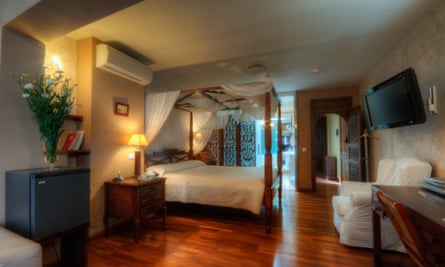
Posada de Palacio, Sanlúcar
This hotel has a faded beauty but a prized location among the palaces and bodegas of the barrio alto (upper town). Comprising three once grand houses, and furnished with antique mirrors, desks, cabinets, clocks, statues, lamps and paintings, it’s like an underfunded museum with comfortable beds. The finest features are the original ones – the internal courtyards, traditional floor tiles, huge bedroom doors and shuttered windows opening on to balconies – all of which retain the authentic spirit of place. The owners plan to renovate and knock through to a fourth house, a neglected old property around the corner which in 1498 allegedly belonged to Columbus.
Calle Caballeros 9-11, +34 956 365060, posadadepalacio.com, doubles from €90
Hotel Argantonio, Cádiz
Central Cádiz looks as if it should be expensive but it’s not. You can find a place to stay within easy walking distance of every monument, plaza and playa on the map without forking out too much. Argantonio is the hotel you hope to find in all cities: central, friendly and affordable, round the corner from a good bar. Quintessentially Andalucían, with tiled floors, fountain and courtyard, it has pretty, if compact, bedrooms. There is parking nearby, but set the teeth and stretch the nostril wide if you’re planning to drop off your luggage first: roads here are narrow and generally have something parked in them.
Calle Argantonio 3, +34 956 211640, hotelargantonio.es, doubles from €85
Hotel La Casa del Califa, Vejer
Hope for rain and curl up in an armchair with a book, linger over lunch in the atmospheric restaurant, watch clouds scudding over the pile of white blocks, domes and church towers that make up this spectacular town. Like Vejer itself, the hotel has a long history (it’s made up of eight houses, dating from the 10th to the 17th centuries, with a 1,000-year-old water cistern, stables, courtyards and a grain store), and is aesthetically pleasing and seductively relaxing. But the Califa is the ideal base from which to explore the coast: Sanlúcar is one hour away; Cádiz one and a half hours – both to the north, and Tarifa just 45 minutes away to the south. The boutiques, bars and churches of Vejer itself are about five paces from the door.
Plaza de España 16, +34 956 447730, lacasadelcalifa.com, closed January, doubles from €80
Wallpaper House and Boston House, La Peña, Tarifa
You’ll appreciate how wild and elemental this coast is after a week in one of these two super-private, prefabricated open-plan beach houses high above the strait of Gibraltar. Sitting in a natural amphitheatre under a rocky ridge, the larger, Wallpaper House, sleeps six and was designed for Wallpaper* magazine. A polite distance away, Boston House, sleeping four, is basic but romantic and engulfed in flowers. It was shipped from the US in bits, with instructions. This is indoor-outdoor living at its best.
+34 687 962 394, elcanchotarifa.com, from €120 a night, minimum seven nights
Riad Lolita, Tarifa
A classy renovation of a 19th-century house, Riad Lolita is available by the room or in its entirety. Languorous and stylish with a touch of the film set, it’s all greys, whites and creams, with tiled floors, marble staircases, beams, shutters and billowing curtains, crisp linens and chandeliers. Rooms are wrapped around an inner courtyard, and shared spaces include a pleasing kitchen – although given its location inside the old city, surrounded by cafés, bars and bakeries, you probably won’t be doing much cooking. The family suite (double, bathroom, and triple) is a rare thing and top value.
Calle Jerez 18, +34 660 863 437, riadlolitatarifa.com, doubles from €50, family suite from €95
Getting there
Ryanair flies to Jerez from Stansted and Gatwick from £54 return. By car Cádiz is 35 minutes and Tarifa 90 minutes away. Trains run from Jerez airport to Cádiz (one hour). Several budget airlines fly to Málaga, which is just over two hours’ drive from Cadiz province.
Sorrel Downer blogs at somewheresville.org
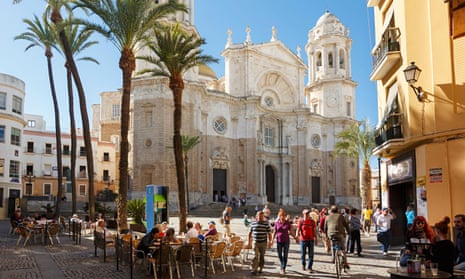
Comments (…)
Sign in or create your Guardian account to join the discussion